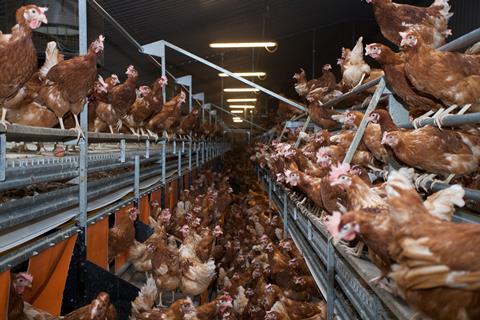The conversation around the prospect of chlorinated chicken coming to UK has primarily focused on food safety, Hadden Turner says that focus is misguided, and much more concern should be directed toward animal welfare, environmental damage and what our food choices say about our faith

Chlorinated chicken. The news has been full of stories about this strange sounding food in recent months, and if the sensationalist news headlines are anything to go by, our supermarket shelves might be stocked with this chicken if the US gets its way in a much-anticipated trade deal with the UK.
Most of the commentary concerns the chicken’s safety for human consumption. While this is important, I fear it has obscured other perhaps more important topics that need to be discussed — issues of animal welfare and sustainability and how we treat God’s creation.
If we view chlorinated chicken through the lenses of animal welfare and environmental care, I believe the answer to “Should Christians eat chlorinated chicken?” becomes a resounding “no”.
Some might wonder whether Christians should eat meat at all! I believe the answer is yes, if your conscience allows you to. There isn’t a biblical warrant for prohibiting Christians to eat meat, instead, the Bible seems to look upon meat eating in a somewhat positive light. (It was commanded under the Passover laws, Jesus ate meat both before and after his resurrection, and in 1 Corinthians 8, Paul explicitly tells the Corinthians that it is ok for Christians to eat meat.)
Our call to care
Much of today’s meat comes from factory farms, where negligent forms of livestock rearing and simply cruel slaughtering practices are the norm. Battery cages for hens. Farrowing crates for pigs.
Livestock are creatures made by God who has commanded that we care for what he has made (Proverbs 12:10; 27:23). By rearing these precious creatures in cramped, unhygienic and immensely stressful conditions, factory farms disobey biblical principles and treat God’s creatures with contempt.
Meat coming from these farms may well be cheaper, but that is only because of inhumane practices which serve to reduce costs and increase efficiency. This is the main problem with chlorinated chicken, the birds are raised in such un hygienic conditions they must be washed in chlorine to kill off harmful pathogens.
The issues with factory farming do not stop at animal welfare. Often, these farms cause significant damage to God’s creation. The wastes coming from factory farms are concentrated and can end up in rivers. This is happening to the River Wye on the English and Welsh border which has suffered from toxic pollution released from nearby chicken factory farms.
The ecological and ethical problems arising from factory farmed meat highlight an often-neglected principle in our Christian witness. We must be careful that we are not supporting through our consumption choices practices that God finds abhorrent, or which destroy his beautiful creation.
By purchasing food from these farms, we are benefiting from sinful practices and giving them our financial support. This, I believe is a serious failure of Christian witness.
Choosing the harder way
However, in our modern world with its long and complex supply chains, a world which has been affected by the fall and sin in every area of life, it is not possible to totally avoid products that are tainted by sin.
Scrupulously checking every product we buy is neither required nor wise. We also must not feel unduly guilty for participating in broken food systems which are an unavoidable fact of modern life. However, when a product has been clearly shown to be deeply immoral, such as with chlorinated chicken, I believe it is our duty to avoid purchasing these foods. Even if they are the cheapest ones on the shelf.
Factory farms disobey biblical principles and treat God’s creatures with contempt.
Avoiding unethical meats does come with its challenges. Most notably, meat from ethical farms costs a lot more. Committing to only buying this meat will mean having to spend more money on our food, leaving us with less money to spend on our other wants. However, self-denial is an integral part of our discipleship. We need to say no to some of our wants if that means saying yes to God’s priorities and commands.
That said, we must tread carefully when it comes to those on low incomes. I wouldn’t demand that anyone in financial hardship forgo all cheap meat — particularly when British welfare standards are still higher than many other countries. But I would still argue that grossly immoral meat such as chlorinated chicken meat is out of bounds.
And there are other ways to respond — they and indeed us all can pressure governments to raise welfare standards on farms and they can teach their children the importance of animal welfare and sustainable eating.
A return to shared feasting
Then there is something we all can do, whether on high incomes or low income. For much of human history, meat was generally unaffordable and only eaten by most at special occasions.
It is only relatively recently that we have come to expect meat to form a substantial part of our diets and for it to be always affordable. It may be better for our bodies, for our planet, and for the animals themselves, if we returned to considering meat as a luxury food and committing to buying only ethical and sustainable meat on the occasions that we partake in it.
And on these occasions that we eat good quality ethical meat, perhaps we should invite friends, especially those with less, to share in food that is good for the body, the soul, and the planet.
A feast of good quality delicious food that can be enjoyed with a clear conscience to the glory and thanks of God. I can think of no better way of dignifying the animal that this meat came from than enjoying it in this convivial, neighbourly, and God-honouring manner.



































2 Readers' comments